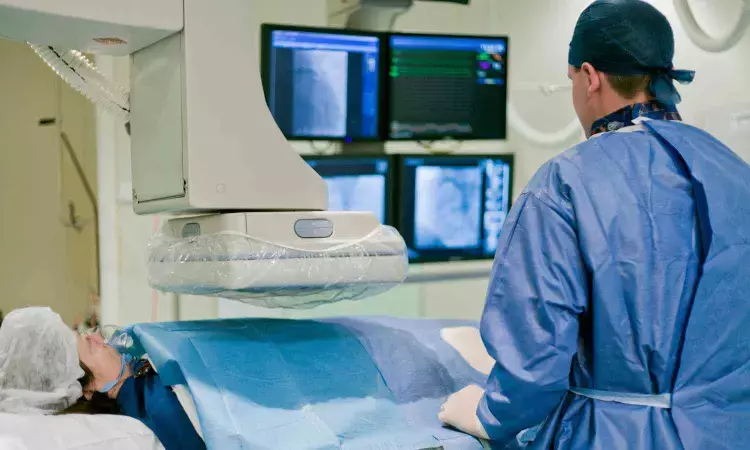- Home
- Medical news & Guidelines
- Anesthesiology
- Cardiology and CTVS
- Critical Care
- Dentistry
- Dermatology
- Diabetes and Endocrinology
- ENT
- Gastroenterology
- Medicine
- Nephrology
- Neurology
- Obstretics-Gynaecology
- Oncology
- Ophthalmology
- Orthopaedics
- Pediatrics-Neonatology
- Psychiatry
- Pulmonology
- Radiology
- Surgery
- Urology
- Laboratory Medicine
- Diet
- Nursing
- Paramedical
- Physiotherapy
- Health news
- Fact Check
- Bone Health Fact Check
- Brain Health Fact Check
- Cancer Related Fact Check
- Child Care Fact Check
- Dental and oral health fact check
- Diabetes and metabolic health fact check
- Diet and Nutrition Fact Check
- Eye and ENT Care Fact Check
- Fitness fact check
- Gut health fact check
- Heart health fact check
- Kidney health fact check
- Medical education fact check
- Men's health fact check
- Respiratory fact check
- Skin and hair care fact check
- Vaccine and Immunization fact check
- Women's health fact check
- AYUSH
- State News
- Andaman and Nicobar Islands
- Andhra Pradesh
- Arunachal Pradesh
- Assam
- Bihar
- Chandigarh
- Chattisgarh
- Dadra and Nagar Haveli
- Daman and Diu
- Delhi
- Goa
- Gujarat
- Haryana
- Himachal Pradesh
- Jammu & Kashmir
- Jharkhand
- Karnataka
- Kerala
- Ladakh
- Lakshadweep
- Madhya Pradesh
- Maharashtra
- Manipur
- Meghalaya
- Mizoram
- Nagaland
- Odisha
- Puducherry
- Punjab
- Rajasthan
- Sikkim
- Tamil Nadu
- Telangana
- Tripura
- Uttar Pradesh
- Uttrakhand
- West Bengal
- Medical Education
- Industry
Fasting not needed before cath lab procedures confirms SCOFF trial

There was no difference in complications in patients who fasted or did not fast before cardiac catheterisation procedures requiring conscious sedation, according to late-breaking research presented in a Hot Line session today at ESC Congress 2024.
“Fasting before a cardiac catheterisation procedure has been recommended to reduce the risk of inhaling the stomach contents and developing aspiration pneumonia. However, for procedures in the catheterisation lab, fasting may not reduce aspiration risk and there are downsides, such as patient discomfort, water depletion, poor blood sugar control and unnecessary fasting for delayed/cancelled procedures. In the SCOFF trial, we were able to show no increased risk of complications with normal eating and that is good news for patients and for healthcare professionals,” said Principal Investigator, Dr. David Ferreira of the John Hunter Hospital, Newcastle, Australia.
The investigator-initiated, randomised SCOFF trial, with a prospective open-label, blinded endpoint design, assessed the non-inferiority of no fasting prior to cardiac catheterisation laboratory procedures requiring conscious sedation. Patients who had been referred for coronary angiography, coronary intervention or cardiac implantable electronic device-related procedures were recruited. They were randomised 1:1 to fasting before the procedure (no solid food for 6 hours and no clear liquids for 2 hours) or to no fasting where the patient was encouraged to have regular meals as usual, but this was not mandatory.
The primary composite endpoint was hypotension, aspiration pneumonia, hyperglycaemia and hypoglycaemia assessed with a Bayesian approach. Secondary endpoints included contrast-induced nephropathy, new intensive care admissions post-procedure, new ventilation requirements post-procedure, new intensive care unit admissions, 30-day readmissions, 30-day mortality, 30-day pneumonia and pre-procedure patient satisfaction.
In total, 716 patients were recruited from six sites in New South Wales, Australia. The mean age was 69 years and 35% were female. As expected, fasting times were longer with fasting compared with no fasting (solid fasting 13.2 hours vs. 3.0 hours, clear liquid fasting 7.0 hours vs. 2.4 hours).
The primary composite outcome occurred in 19.1% in the fasting group and 12.0% in the no-fasting group. In an intention to treat analysis, the estimate of the mean posterior difference was −5.2% (95% confidence interval [CI] −9.6 to −0.9) favouring no fasting. This result confirmed the non-inferiority of no fasting, based on a non-inferiority margin of 3% with a likelihood of greater than 99.5%. No fasting was also potentially superior to fasting for the primary outcome with a likelihood of 99.1%. There was an absolute risk difference between the groups of 7.1% in favour of no fasting, with a number needed to treat of 14.1 to prevent one primary outcome event.
In analyses of secondary outcome events, no apparent differences were observed without and with fasting. Patient satisfaction was significantly better without fasting vs. with fasting when assessed via a questionnaire: 11 vs. 15 points where a lower score indicates greater satisfaction (posterior mean difference, 4.02 points; 95% CI 3.36 to 4.67; Bayes factor ≥100).
“Taken together with data from the CHOW-NOW, TONIC and the Fast-CIED trials and from various observational studies, there is now a strong case that fasting is not needed in patients undergoing these types of procedures. Removing fasting has been consistently shown to be safe, patients often prefer not to fast and there are logistical benefits to the healthcare system if patients can eat and drink normally. With this new evidence, I think it is now time to reconsider fasting requirements in clinical guidelines,” concluded Dr. Ferreira.
Dr Kamal Kant Kohli-MBBS, DTCD- a chest specialist with more than 30 years of practice and a flair for writing clinical articles, Dr Kamal Kant Kohli joined Medical Dialogues as a Chief Editor of Medical News. Besides writing articles, as an editor, he proofreads and verifies all the medical content published on Medical Dialogues including those coming from journals, studies,medical conferences,guidelines etc. Email: drkohli@medicaldialogues.in. Contact no. 011-43720751


